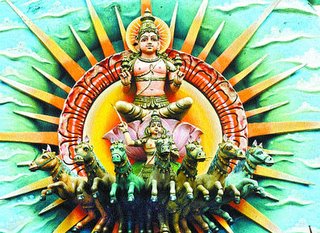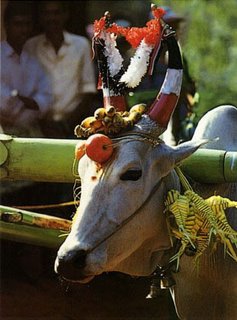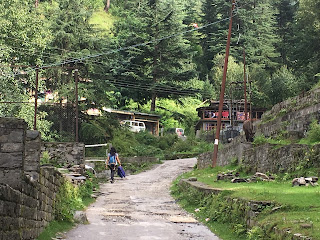Fields of Gold
 The four-day fesitivity of Pongal has come to a close. In some parts of India, Pongal is celebrated as Makara Sankaranthi. It is occasions such as these that I missed when I was abroad. It is a time when the family gets together and celebrates. I was quite lucky to have spent my childhood days celebrating Pongal in my father’s native village in Kumbakonam. A tiny village called Kanjivoy that was safely hidden away from prying eyes, so much so that only the locals were aware that such a village existed.
The four-day fesitivity of Pongal has come to a close. In some parts of India, Pongal is celebrated as Makara Sankaranthi. It is occasions such as these that I missed when I was abroad. It is a time when the family gets together and celebrates. I was quite lucky to have spent my childhood days celebrating Pongal in my father’s native village in Kumbakonam. A tiny village called Kanjivoy that was safely hidden away from prying eyes, so much so that only the locals were aware that such a village existed.The usual practice was to drive down, but later we started using the train and bus services. From Chennai to Kumbakonam, we took a train and from there we took the local buses that dropped us off at the vilage entrance. We would have already notified my uncle of our arrival. That is the fun part. My uncle has been a farmer all his life. Bullock carts are the modes of transportation and ofcourse for city bred kids, it was a matter of great fascination and excitement. My brother and I took our places in the front, beside my uncle, legs dangling in joy, with the tails of the oxes swishing on our faces. The entire trip from the road to our village house was enthralling. You are greeted by the endless stretches of green pastures under an azure blue sky, a lonely kingfisher waiting for its gullible friends from the marine world and groups of white water birds engrossed in fishing. The air is incredibly fresh and the people exude a genuine warmth and affection.

On the day of the grand occasion, the household is abuzz with activity in the early hours of the morning. The house is kept spick and span and mango leaves tied at the house entrance. Beautiful rangoli designs adorn every household. The women dress up in silk sarees and the men, in sparklingly white silk dhotis. Sugarcanes and other fruits are heaped up in the pooja room. Pongal is made in a decorated earthen pot and when the rice pours out, a chorus of voices yell out, “Pongalo Pongal”.
The Sun god is the main deity and he is worshipped on this day. Three qualities about the Sun that one should remember are punctuality, sacrificial nature and equanitmity. He rises at a certain time and sets at a certain time everyday. He is the life giver and provides light to all creatures, big and small, rich and poor, good and bad folks. He provides sunlight without expecting anything in return which, signifies his sacrificial nature.

Maatu Pongal is the best though (Maatu in Tamil means Cows). The cows and the oxes are tended to with great reverence and dedication. They are scrubbed clean and washed thoroughly. Red tilak and turmeric is applied on their forehead and pooja is performed. The horns are painted in bright hues and the anklet like jewllery adorns their feet. The sound emanating from the anklets are like the rush of the ocean waves. The horns are covered with flowers. It is believed that the gods reside in the cow. Hence the cow is revered and believed to be a symbol of purity. The cow gives milk to the entire human race without prejudice, its dung is used as a disinfectant and when the dung is dried, it is used as firewood. The oxes till the land that gives food. Hence without the farmers and these wonderful creatures, we would not be getting our daily bread.
Jallikattu, the risky sport where young men try to prove thier valour by taming the bulls is pursued with a lot of gusto during this festival. The Spanish version would be the matadors. Sometimes, people get gored to death, but it does not affect their spirit of adventure.
 Pongal celebrates the harvest season and more importantly, it celebrates the contributions of the agrarian community and the fruits of nature. For me, the season signifies the sacrifice and generousity of a simple community without whom none of us would be here.
Pongal celebrates the harvest season and more importantly, it celebrates the contributions of the agrarian community and the fruits of nature. For me, the season signifies the sacrifice and generousity of a simple community without whom none of us would be here. It is the time, when man, beast and nature come together and reminds a materialistic world about the sacrifices of a forgotten land.


Comments
Hee hee I completely forgot to wish 'you' for Maatu Pongal. :P